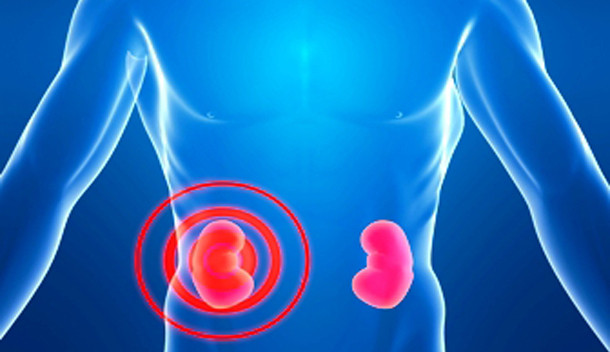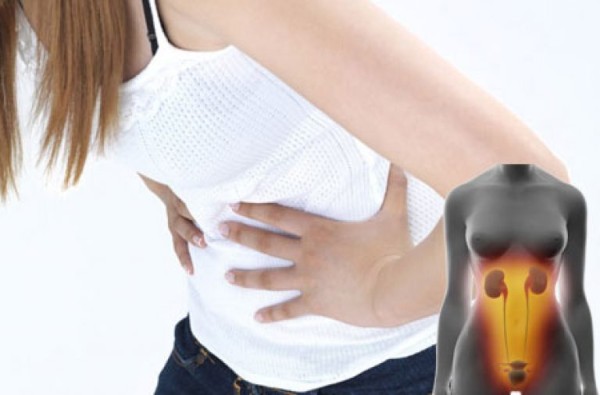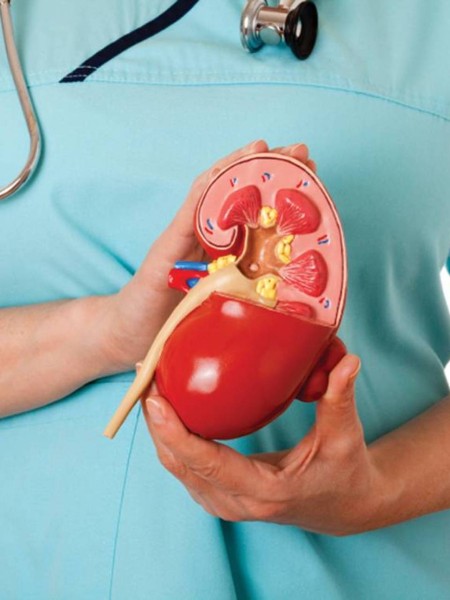Pyelonephritis: causes, symptoms, treatment
In the cold season, in addition to standard colds, there is an exacerbation of existing diseases. Migraines begin to bother, pressure jumps, joints hurt and cramps occur when urinating. This article will tell you what kind of disease pyelonephritis is, what types it is and how you can treat it.
Content
What is pyelonephritis
Pyelonephritis is an acute infectious inflammation of the kidneys. It is associated with the pathogenic activity of bacteria entering the urinary tract from the lower parts of the urinary system. It is mainly caused by the presence of E. coli in the urinary tract. Most often it occurs as a result of hypothermia.
The most common urological disease occurs in 75% of patients. Most often, female representatives suffer from it. Often, in time, incompletely treated cystitis flows into this particular form of the disease. It is not worth underestimating this disease, as neglect and attempts to numb the symptoms can lead to kidney failure, abscess or sepsis. It is especially dangerous to start this disease for pregnant women and people with diabetes. Since in these cases the load on the kidneys is already increased, you should not aggravate this and force your body to work hard.
Pyelonephritis - symptoms in women
This disease has 2 forms - acute and chronic. If an acute form has occurred, you should not lower your vigilance when the main symptoms disappear. The disease easily becomes chronic. In which the symptoms may not cause significant inconvenience, or disappear altogether.
You can recognize the occurrence of pyelonephritis in girls by the following signs:
- Acute pain in the lumbar region, in the side or in the lower abdomen.
- A sharp rise in temperature up to 38-40 degrees.
- General deterioration of health - weakness, nausea, vomiting, chills.
- Discoloration of urine, cloudiness, impurities or blood stains. The appearance of a pungent odor from feces.
- Acute pain during urination, making this process very difficult.
- Frequent urge to urinate, but attempts to defecate are unsuccessful.
- Swelling of the limbs.
- Dehydration.
- Heartbeat failure.
- An increase in the number of leukocytes to urine, with the delivery of OAM.
- Enlargement of one kidney when examined with an ultrasound machine.
Before pyelonephritis develops, girls usually have symptoms of cystitis - cramps and frequent urge to urinate, a change in the color of discharge.
Causes of pyelonephritis
The main causes of pyelonephritis are hypothermia and bacterial activity. Besides these reasons, there are others. Which cause illness less often, but you shouldn't lose sight of them either.
Causes of pyelonephritis:
- repeated and not completely cured mild forms of diseases of the genitourinary system;
- untimely emptying of the bladder;
- a decline in immunity due to existing diseases - HIV, diabetes, hypovitaminosis, stress;
- incorrect treatment of cystitis;
- pregnancy- fetal pressure on the kidneys;
- inflammatory processes in the body;
- blockage of the ureters with a stone;
- structural features of the female body - short urethra;
- the beginning of sexual activity.
This disease can also be asymptomatic. When pain occurs, the kidneys are often destroyed. Therefore, it is imperative to undergo a kidney examination once a year.
Preventive measures to detect pyelonephritis include:
- Examination by a urologist.
- Palpation of the abdomen and tapping of the back and lower back for pain.
- Delivery of urine for analysis - OAM, according to Zimnitsky, according to Nechiporenko.
- Blood tests - general and biochemical.
- Ultrasound of the kidneys.
Chronic pyelonephritis
In the chronic form, the disease may be asymptomatic. That is, do not deliver obvious discomfort to the patient. But when examined on an ultrasound machine, a noticeable change in the pelvis, tubules and vessels of the kidneys is noticeable.
In the chronic form of the disease, both kidneys are most often affected. While with acute - only one. But do not forget about possible seasonal exacerbations of a chronic disease. In this case, there may be no temperature. But aching pain in the lower abdomen and difficulty urinating will be necessary.
Symptoms of the latent form of the disease:
- rare and weakly felt pain in the lower back or lower abdomen;
- almost imperceptible difficulty in emptying the bladder;
- in the evening, the temperature may rise to 37.1;
- increased fatigue, weakness, drowsiness;
- decreased appetite;
- headaches;
- a feeling of heaviness in the lower back when you are on your feet for a long time;
- depression and apathy;
- the skin becomes dry, flakes, changes color to yellow-gray;
- the appearance of a dark plaque on the mucous membranes;
- persistent dry mouth;
- pressure surges, more often an increase;
- an increase in the amount of urine up to 3 liters per day;
- as a consequence of the previous point - pain in bones and joints. Since the required calcium is washed out.
Treatment of the chronic form of this ailment includes an individual approach to each patient. And it must necessarily include a special diet and a set of measures that are aimed at eliminating the reasons that prevent the natural outflow of urine. Plus, of course, drug treatment of the problem and preventive therapy with diuretics.
Why is chronic pyelonephritis dangerous?
- Shrinking of the kidneys.
- Renal failure
- Slag retention.
- Hypertension.
- Heart failure.
Diet for kidney disease:
- complete exclusion of spicy and salty;
- refusal from alcohol and excessive consumption of strong coffee;
- food should be light and not high in calories;
- the maximum amount of calorie consumption is 2500 per day for an adult;
- the most useful and fortified food;
- a large number of dairy products in the diet;
- compulsory consumption of fish and seafood;
- the predominant amount in the diet of a patient with pyelonephritis should be steamed, stewed or boiled vegetables;
- if there are no problems with blood pressure - drinking a lot of water, up to 3 liters per day;
- fruit drinks and compotes with the use of natural antiseptics - cranberries, raspberries, strawberries;
- a large number of fresh seasonal fruits.
Acute pyelonephritis
If acute pyelonephritis is not cured within the first three months, the disease will become chronic.
The acute form of this ailment can develop as a consequence of such diseases:
- Flu.
- Angina.
- Caries and inflammation in the oral cavity.
- Tonsillitis.
- Bronchitis.
- Scarlet fever.
Most often, the causative agents of the acute form of pyelonephritis are bacteria, viruses, fungus. The spread of infection is possible in the following ways:
- Lymphogenous.
- Hematogenous. Infection occurs from any inflammatory process in the body. Tooth decay, inflamed tonsils, or gallbladder
- Ascending. It occurs as a result of inflammatory processes in the genitourinary system, as well as the presence of stones and sand in the kidneys. The most common method for the onset of the disease.
If you have the following diseases, you are at risk for pyelonephritis:
- Frequent allergies.
- Regular weakening immunity.
- Frequent colds.
- Avitaminosis.
- Pregnancy.
- Diabetes.
- Lower back injuries.
The diet in this case is recommended the same as in the chronic form of the disease. In acute pyelonephritis, the following foods should be completely excluded from the diet:
- fatty rich broths;
- radish, radish;
- horseradish;
- onion garlic;
- legumes;
- White cabbage;
- strong coffee and tea;
- whole milk;
- sorrel, spinach;
- Rye bread.
Pyelonephritis during pregnancy
This disease for the first time in women during the period of bearing a child is quite rare. Only in 1-4% of cases. Most often, there is an exacerbation of a previously existing disease.
In most cases, during pregnancy, this ailment is associated with an increase in the size of the uterus. She begins to put pressure on all the internal organs of the woman. Including the kidneys. And makes it difficult for urine to pass. In this case, the symptoms may not be as pronounced as during the normal course of pregnancy, or be absent altogether. But, necessarily when analyzing the composition of urine and blood, an increased level of leukocytes and protein in the urine will be found.
Hormonal changes in the body of the expectant mother are a favorable background for the development of this ailment. This impedes the peristalsis of the ureters and makes it difficult for urine to flow. As a result, a good soil is created for the activity of bacteria.
Often, as a consequence of pyelonephritis, anemia and sepsis occur in pregnant women and women who have already given birth. This ailment during pregnancy affects women who neglect personal hygiene and women who already have 2 or more children.
Kidney disease is not something to be put off for later. Especially during pregnancy. Therefore, in this case, there can be no question of self-medication. Be sure to tell your doctor about your symptoms and undergo a complete medical examination of the genitourinary system. Treatment with traditional medicine should also be discussed with your doctor. Not all herbs are approved for use during pregnancy.
As a rule, a specialist is obliged to prescribe the use of antibiotics to stop the development of the inflammatory process. There are a number of drugs approved for use in pregnancy. For example, Ampicillin, Oxacillin.
It is forbidden to use products containing such substances as:
- Biseptol.
- Levomitecin.
- Tetracycline.
- Furazolidone.
Also, without fail, antispasmodics and pain relievers are prescribed for high-quality treatment of renal disease. During pregnancy, the use of No-shpy is allowed. The appointment of a vitamin complex is mandatory. But therapy with diuretics is carried out strictly in a hospital, under the constant supervision of a doctor. The patient is recommended complete rest and bed rest. But forgetting about the benefits of walking during pregnancy is also not worth it. Avoid stagnation of blood in the pelvic organs. This threatens the fetus with hypoxia.
Diet should not be neglected. It is possible to carry out "positional" therapy. The patient is placed on a special table. The expectant mother should take the fetal position, pulling her knees up to her chest as much as possible. After that, special mechanisms raise the table in such a position that the legs are higher than the head. In this situation, there is a decrease in the pressure of the uterus on the kidneys.
Why is pyelonephritis dangerous?
Starting this disease is fraught with serious health problems. This ailment leads to a decrease in the surface of the working renal tissue. Consequently, the kidney will not be able to fulfill its function of filtering the blood. This means that slags and harmful substances will begin to accumulate in the body, intoxication may occur. The gradual decline in working tissue can lead to kidney failure. In this case, an organ transplant may be required. Or constant blood filtration using special equipment.
Pyelonephritis treatment
Since this disease is an inflammatory process, antibiotics cannot be dispensed with. What drug is needed in your specific case of the disease - the specialist will determine. After a full examination and delivery of all the necessary tests. It is highly recommended to combine the intake of antibacterial agents with drugs that restore the beneficial intestinal microflora. Otherwise, you can cure the kidneys, but spoil the intestines and even the stomach.
For a high-quality treatment of this problem, a complex of therapeutic measures is required. That is, taking medication alone will not be enough. Be sure to follow a strict diet, minimize salt intake. But, if there is no increase in blood pressure, you should not completely abandon salt.
Also, the patient is shown complete rest. At least for the duration of acute pains and high fever.
Alternative treatment of pyelonephritis
Traditional medicine offers a wide variety of diuretic herbs that have anti-inflammatory properties. For example:
- orthosiphon;
- bearberry;
- horsetail;
- strawberry leaves;
- Bay leaf;
- wild apples;
- stigmas of corn;
- rosehip;
- Birch buds;
- parsley root.
Brew the above herbs with boiling water, let it brew and take 1-2 tablespoons 3 times a day, before meals.
The mixture for rubbing the lower back from kefir and fir oil received good reviews. Proportion 3: 1. The course of treatment is one month.
Prevention of pyelonephritis
To prevent the development of the disease in the future, observe the following rules:
- exclude hypothermia of the body;
- timely and efficiently treat any inflammatory processes in the body - colds, toothaches;
- do not forget to go to the toilet during;
- thoroughly perform the hygiene of the genitals;
- exclude unprotected sex;
- give up bad habits and abuse of salty and spicy foods;
- completely switch to proper nutrition, exclude soda, mayonnaise, semi-finished products;
- consume at least 2-2.5 liters of liquid per day - clean water, tea, juice, compote.












